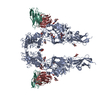[English] 日本語
 Yorodumi
Yorodumi- EMDB-21418: Leg region of the closed conformation of the human type 1 insulin... -
+ Open data
Open data
- Basic information
Basic information
| Entry | Database: EMDB / ID: EMD-21418 | |||||||||
|---|---|---|---|---|---|---|---|---|---|---|
| Title | Leg region of the closed conformation of the human type 1 insulin-like growth factor receptor ectodomain in complex with human insulin-like growth factor II | |||||||||
 Map data Map data | leg part of the close conformation | |||||||||
 Sample Sample |
| |||||||||
| Function / homology |  Function and homology information Function and homology informationcardiac atrium development / negative regulation of cholangiocyte apoptotic process /  insulin-like growth factor receptor activity / positive regulation of steroid hormone biosynthetic process / insulin-like growth factor receptor activity / positive regulation of steroid hormone biosynthetic process /  protein kinase complex / protein transporter activity / Signaling by Type 1 Insulin-like Growth Factor 1 Receptor (IGF1R) / IRS-related events triggered by IGF1R / protein kinase complex / protein transporter activity / Signaling by Type 1 Insulin-like Growth Factor 1 Receptor (IGF1R) / IRS-related events triggered by IGF1R /  insulin-like growth factor binding / negative regulation of muscle cell apoptotic process ...cardiac atrium development / negative regulation of cholangiocyte apoptotic process / insulin-like growth factor binding / negative regulation of muscle cell apoptotic process ...cardiac atrium development / negative regulation of cholangiocyte apoptotic process /  insulin-like growth factor receptor activity / positive regulation of steroid hormone biosynthetic process / insulin-like growth factor receptor activity / positive regulation of steroid hormone biosynthetic process /  protein kinase complex / protein transporter activity / Signaling by Type 1 Insulin-like Growth Factor 1 Receptor (IGF1R) / IRS-related events triggered by IGF1R / protein kinase complex / protein transporter activity / Signaling by Type 1 Insulin-like Growth Factor 1 Receptor (IGF1R) / IRS-related events triggered by IGF1R /  insulin-like growth factor binding / negative regulation of muscle cell apoptotic process / cellular response to progesterone stimulus / positive regulation of DNA metabolic process / protein localization to nuclear periphery / cellular response to zinc ion starvation / cellular response to aldosterone / Activation of the AP-1 family of transcription factors / response to amino acid starvation / insulin-like growth factor binding / negative regulation of muscle cell apoptotic process / cellular response to progesterone stimulus / positive regulation of DNA metabolic process / protein localization to nuclear periphery / cellular response to zinc ion starvation / cellular response to aldosterone / Activation of the AP-1 family of transcription factors / response to amino acid starvation /  mediator complex binding / negative regulation of ribosomal protein gene transcription by RNA polymerase II / positive regulation of cellular response to amino acid starvation / mediator complex binding / negative regulation of ribosomal protein gene transcription by RNA polymerase II / positive regulation of cellular response to amino acid starvation /  insulin receptor complex / cellular response to testosterone stimulus / negative regulation of hepatocyte apoptotic process / insulin receptor complex / cellular response to testosterone stimulus / negative regulation of hepatocyte apoptotic process /  insulin-like growth factor I binding / insulin-like growth factor I binding /  insulin receptor activity / insulin receptor activity /  transcytosis / nitrogen catabolite activation of transcription from RNA polymerase II promoter / alphav-beta3 integrin-IGF-1-IGF1R complex / response to alkaloid / positive regulation of protein-containing complex disassembly / cellular response to angiotensin / cellular response to insulin-like growth factor stimulus / transcytosis / nitrogen catabolite activation of transcription from RNA polymerase II promoter / alphav-beta3 integrin-IGF-1-IGF1R complex / response to alkaloid / positive regulation of protein-containing complex disassembly / cellular response to angiotensin / cellular response to insulin-like growth factor stimulus /  dendritic spine maintenance / response to L-glutamate / dendritic spine maintenance / response to L-glutamate /  insulin binding / establishment of cell polarity / negative regulation of MAPK cascade / positive regulation of axon regeneration / amyloid-beta clearance / positive regulation of cytokinesis / positive regulation of osteoblast proliferation / TFIID-class transcription factor complex binding / regulation of JNK cascade / amino acid biosynthetic process / insulin binding / establishment of cell polarity / negative regulation of MAPK cascade / positive regulation of axon regeneration / amyloid-beta clearance / positive regulation of cytokinesis / positive regulation of osteoblast proliferation / TFIID-class transcription factor complex binding / regulation of JNK cascade / amino acid biosynthetic process /  estrous cycle / estrous cycle /  insulin receptor substrate binding / G-protein alpha-subunit binding / positive regulation of transcription initiation by RNA polymerase II / positive regulation of RNA polymerase II transcription preinitiation complex assembly / response to vitamin E / SHC-related events triggered by IGF1R / insulin receptor substrate binding / G-protein alpha-subunit binding / positive regulation of transcription initiation by RNA polymerase II / positive regulation of RNA polymerase II transcription preinitiation complex assembly / response to vitamin E / SHC-related events triggered by IGF1R /  phosphatidylinositol 3-kinase binding / peptidyl-tyrosine autophosphorylation / cellular response to transforming growth factor beta stimulus / phosphatidylinositol 3-kinase binding / peptidyl-tyrosine autophosphorylation / cellular response to transforming growth factor beta stimulus /  T-tubule / cellular response to amino acid starvation / cellular response to dexamethasone stimulus / cerebellum development / T-tubule / cellular response to amino acid starvation / cellular response to dexamethasone stimulus / cerebellum development /  axonogenesis / insulin-like growth factor receptor signaling pathway / response to nicotine / phosphatidylinositol 3-kinase/protein kinase B signal transduction / cellular response to estradiol stimulus / axonogenesis / insulin-like growth factor receptor signaling pathway / response to nicotine / phosphatidylinositol 3-kinase/protein kinase B signal transduction / cellular response to estradiol stimulus /  caveola / cellular response to glucose stimulus / hippocampus development / positive regulation of smooth muscle cell proliferation / caveola / cellular response to glucose stimulus / hippocampus development / positive regulation of smooth muscle cell proliferation /  insulin receptor binding / insulin receptor binding /  receptor protein-tyrosine kinase / cellular response to mechanical stimulus / RNA polymerase II transcription regulator complex / cellular response to amyloid-beta / : / receptor protein-tyrosine kinase / cellular response to mechanical stimulus / RNA polymerase II transcription regulator complex / cellular response to amyloid-beta / : /  cellular senescence / insulin receptor signaling pathway / positive regulation of cold-induced thermogenesis / DNA-binding transcription activator activity, RNA polymerase II-specific / cellular senescence / insulin receptor signaling pathway / positive regulation of cold-induced thermogenesis / DNA-binding transcription activator activity, RNA polymerase II-specific /  protein tyrosine kinase activity / response to ethanol / protein tyrosine kinase activity / response to ethanol /  transcription regulator complex / RNA polymerase II-specific DNA-binding transcription factor binding / sequence-specific DNA binding / Extra-nuclear estrogen signaling / positive regulation of MAPK cascade / protein autophosphorylation / positive regulation of phosphatidylinositol 3-kinase/protein kinase B signal transduction / transcription regulator complex / RNA polymerase II-specific DNA-binding transcription factor binding / sequence-specific DNA binding / Extra-nuclear estrogen signaling / positive regulation of MAPK cascade / protein autophosphorylation / positive regulation of phosphatidylinositol 3-kinase/protein kinase B signal transduction /  receptor complex / DNA-binding transcription factor activity, RNA polymerase II-specific / intracellular signal transduction / positive regulation of cell migration / receptor complex / DNA-binding transcription factor activity, RNA polymerase II-specific / intracellular signal transduction / positive regulation of cell migration /  immune response / RNA polymerase II cis-regulatory region sequence-specific DNA binding / DNA-binding transcription factor activity / immune response / RNA polymerase II cis-regulatory region sequence-specific DNA binding / DNA-binding transcription factor activity /  axon / intracellular membrane-bounded organelle / neuronal cell body / axon / intracellular membrane-bounded organelle / neuronal cell body /  chromatin binding / positive regulation of cell population proliferation / protein-containing complex binding / negative regulation of apoptotic process chromatin binding / positive regulation of cell population proliferation / protein-containing complex binding / negative regulation of apoptotic processSimilarity search - Function | |||||||||
| Biological species |   Homo sapiens (human) / Homo sapiens (human) /   Saccharomyces cerevisiae (strain ATCC 204508 / S288c) (yeast) Saccharomyces cerevisiae (strain ATCC 204508 / S288c) (yeast) | |||||||||
| Method |  single particle reconstruction / single particle reconstruction /  cryo EM / Resolution: 4.21 Å cryo EM / Resolution: 4.21 Å | |||||||||
 Authors Authors | Xu Y / Kirk NS / Lawrence MC / Croll TI | |||||||||
| Funding support |  Australia, Australia,  United Kingdom, 2 items United Kingdom, 2 items
| |||||||||
 Citation Citation |  Journal: Structure / Year: 2020 Journal: Structure / Year: 2020Title: How IGF-II Binds to the Human Type 1 Insulin-like Growth Factor Receptor. Authors: Yibin Xu / Nicholas S Kirk / Hariprasad Venugopal / Mai B Margetts / Tristan I Croll / Jarrod J Sandow / Andrew I Webb / Carlie A Delaine / Briony E Forbes / Michael C Lawrence /   Abstract: Human type 1 insulin-like growth factor receptor (IGF-1R) signals chiefly in response to the binding of insulin-like growth factor I. Relatively little is known about the role of insulin-like growth ...Human type 1 insulin-like growth factor receptor (IGF-1R) signals chiefly in response to the binding of insulin-like growth factor I. Relatively little is known about the role of insulin-like growth factor II signaling via IGF-1R, despite the affinity of insulin-like growth factor II for IGF-1R being within an order of magnitude of that of insulin-like growth factor I. Here, we describe the cryoelectron microscopy structure of insulin-like growth factor II bound to a leucine-zipper-stabilized IGF-1R ectodomain, determined in two conformations to a maximum average resolution of 3.2 Å. The two conformations differ in the relative separation of their respective points of membrane entry, and comparison with the structure of insulin-like growth factor I bound to IGF-1R reveals long-suspected differences in the way in which the critical C domain of the respective growth factors interact with IGF-1R. | |||||||||
| History |
|
- Structure visualization
Structure visualization
| Movie |
 Movie viewer Movie viewer |
|---|---|
| Structure viewer | EM map:  SurfView SurfView Molmil Molmil Jmol/JSmol Jmol/JSmol |
| Supplemental images |
- Downloads & links
Downloads & links
-EMDB archive
| Map data |  emd_21418.map.gz emd_21418.map.gz | 230 MB |  EMDB map data format EMDB map data format | |
|---|---|---|---|---|
| Header (meta data) |  emd-21418-v30.xml emd-21418-v30.xml emd-21418.xml emd-21418.xml | 16.1 KB 16.1 KB | Display Display |  EMDB header EMDB header |
| Images |  emd_21418.png emd_21418.png | 23.2 KB | ||
| Archive directory |  http://ftp.pdbj.org/pub/emdb/structures/EMD-21418 http://ftp.pdbj.org/pub/emdb/structures/EMD-21418 ftp://ftp.pdbj.org/pub/emdb/structures/EMD-21418 ftp://ftp.pdbj.org/pub/emdb/structures/EMD-21418 | HTTPS FTP |
-Related structure data
| Related structure data |  6vwjMC  6vwgC  6vwhC  6vwiC C: citing same article ( M: atomic model generated by this map |
|---|---|
| Similar structure data |
- Links
Links
| EMDB pages |  EMDB (EBI/PDBe) / EMDB (EBI/PDBe) /  EMDataResource EMDataResource |
|---|---|
| Related items in Molecule of the Month |
- Map
Map
| File |  Download / File: emd_21418.map.gz / Format: CCP4 / Size: 244.1 MB / Type: IMAGE STORED AS FLOATING POINT NUMBER (4 BYTES) Download / File: emd_21418.map.gz / Format: CCP4 / Size: 244.1 MB / Type: IMAGE STORED AS FLOATING POINT NUMBER (4 BYTES) | ||||||||||||||||||||||||||||||||||||||||||||||||||||||||||||
|---|---|---|---|---|---|---|---|---|---|---|---|---|---|---|---|---|---|---|---|---|---|---|---|---|---|---|---|---|---|---|---|---|---|---|---|---|---|---|---|---|---|---|---|---|---|---|---|---|---|---|---|---|---|---|---|---|---|---|---|---|---|
| Annotation | leg part of the close conformation | ||||||||||||||||||||||||||||||||||||||||||||||||||||||||||||
| Projections & slices | Image control
Images are generated by Spider. | ||||||||||||||||||||||||||||||||||||||||||||||||||||||||||||
| Voxel size | X=Y=Z: 1.06 Å | ||||||||||||||||||||||||||||||||||||||||||||||||||||||||||||
| Density |
| ||||||||||||||||||||||||||||||||||||||||||||||||||||||||||||
| Symmetry | Space group: 1 | ||||||||||||||||||||||||||||||||||||||||||||||||||||||||||||
| Details | EMDB XML:
CCP4 map header:
| ||||||||||||||||||||||||||||||||||||||||||||||||||||||||||||
-Supplemental data
- Sample components
Sample components
-Entire : Leg region of the open-leg conformation of the human type 1 insul...
| Entire | Name: Leg region of the open-leg conformation of the human type 1 insulin-like growth factor receptor ectodomain in complex with human insulin-like growth factor II |
|---|---|
| Components |
|
-Supramolecule #1: Leg region of the open-leg conformation of the human type 1 insul...
| Supramolecule | Name: Leg region of the open-leg conformation of the human type 1 insulin-like growth factor receptor ectodomain in complex with human insulin-like growth factor II type: complex / ID: 1 / Parent: 0 / Macromolecule list: all |
|---|---|
| Source (natural) | Organism:   Homo sapiens (human) Homo sapiens (human) |
| Molecular weight | Theoretical: 250 KDa |
-Macromolecule #1: Leucine-zippered human type 1 insulin-like growth factor receptor...
| Macromolecule | Name: Leucine-zippered human type 1 insulin-like growth factor receptor ectodomain type: protein_or_peptide / ID: 1 / Number of copies: 2 / Enantiomer: LEVO / EC number:  receptor protein-tyrosine kinase receptor protein-tyrosine kinase |
|---|---|
| Source (natural) | Organism:   Saccharomyces cerevisiae (strain ATCC 204508 / S288c) (yeast) Saccharomyces cerevisiae (strain ATCC 204508 / S288c) (yeast)Strain: ATCC 204508 / S288c |
| Molecular weight | Theoretical: 108.937242 KDa |
| Recombinant expression | Organism:   Cricetulus griseus (Chinese hamster) Cricetulus griseus (Chinese hamster) |
| Sequence | String: EICGPGIDIR NDYQQLKRLE NCTVIEGYLH ILLISKAEDY RSYRFPKLTV ITEYLLLFRV AGLESLGDLF PNLTVIRGWK LFYNYALVI FEMTNLKDIG LYNLRNITRG AIRIEKNADL CYLSTVDWSL ILDAVSNNYI VGNKPPKECG DLCPGTMEEK P MCEKTTIN ...String: EICGPGIDIR NDYQQLKRLE NCTVIEGYLH ILLISKAEDY RSYRFPKLTV ITEYLLLFRV AGLESLGDLF PNLTVIRGWK LFYNYALVI FEMTNLKDIG LYNLRNITRG AIRIEKNADL CYLSTVDWSL ILDAVSNNYI VGNKPPKECG DLCPGTMEEK P MCEKTTIN NEYNYRCWTT NRCQKMCPST CGKRACTENN ECCHPECLGS CSAPDNDTAC VACRHYYYAG VCVPACPPNT YR FEGWRCV DRDFCANILS AESSDSEGFV IHDGECMQEC PSGFIRNGSQ SMYCIPCEGP CPKVCEEEKK TKTIDSVTSA QML QGCTIF KGNLLINIRR GNNIASELEN FMGLIEVVTG YVKIRHSHAL VSLSFLKNLR LILGEEQLEG NYSFYVLDNQ NLQQ LWDWD HRNLTIKAGK MYFAFNPKLC VSEIYRMEEV TGTKGRQSKG DINTRNNGER ASCESDVLHF TSTTTSKNRI IITWH RYRP PDYRDLISFT VYYKEAPFKN VTEYDGQDAC GSNSWNMVDV DLPPNKDVEP GILLHGLKPW TQYAVYVKAV TLTMVE NDH IRGAKSEILY IRTNASVPSI PLDVLSASNS SSQLIVKWNP PSLPNGNLSY YIVRWQRQPQ DGYLYRHNYC SKDKIPI RK YADGTIDIEE VTENPKTEVC GGEKGPCCAC PKTEAEKQAE KEEAEYRKVF ENFLHNSIFV PRPERKRRDV MQVANTTM S SRSRNTTAAD TYNITDPEEL ETEYPFFESR VDNKERTVIS NLRPFTLYRI DIHSCNHEAE KLGCSASNFV FARTMPAEG ADDIPGPVTW EPRPENSIFL KWPEPENPNG LILMYEIKYG SQVEDQRECV SRQEYRKYGG AKLNRLNPGN YTARIQATSL SGNGSWTDP VFFYVQAKTG YENFIHRMKQ LEDKVEELLS KNYHLENEVA RLKKLVGERS SSEQKLISEE DLN |
-Experimental details
-Structure determination
| Method |  cryo EM cryo EM |
|---|---|
 Processing Processing |  single particle reconstruction single particle reconstruction |
| Aggregation state | particle |
- Sample preparation
Sample preparation
| Concentration | 0.1 mg/mL | ||||||||||
|---|---|---|---|---|---|---|---|---|---|---|---|
| Buffer | pH: 7.5 Component:
| ||||||||||
| Grid | Model: Quantifoil, UltrAuFoil, R1.2/1.3 / Material: GOLD / Mesh: 300 / Pretreatment - Type: GLOW DISCHARGE / Details: 15mA current | ||||||||||
| Vitrification | Cryogen name: ETHANE / Chamber humidity: 100 % / Chamber temperature: 277 K / Instrument: FEI VITROBOT MARK IV | ||||||||||
| Details | IGFII:IGF-1R molar ratio 1.5:1 |
- Electron microscopy
Electron microscopy
| Microscope | FEI TITAN KRIOS |
|---|---|
| Electron beam | Acceleration voltage: 300 kV / Electron source:  FIELD EMISSION GUN FIELD EMISSION GUN |
| Electron optics | C2 aperture diameter: 50.0 µm / Illumination mode: FLOOD BEAM / Imaging mode: BRIGHT FIELD Bright-field microscopy / Cs: 2.7 mm Bright-field microscopy / Cs: 2.7 mm |
| Specialist optics | Energy filter - Name: GIF Quantum LS |
| Sample stage | Cooling holder cryogen: NITROGEN |
| Image recording | Film or detector model: GATAN K2 SUMMIT (4k x 4k) / Detector mode: COUNTING / Digitization - Frames/image: 1-50 / Number grids imaged: 1 / Number real images: 4585 / Average exposure time: 10.0 sec. / Average electron dose: 50.0 e/Å2 |
| Experimental equipment |  Model: Titan Krios / Image courtesy: FEI Company |
- Image processing
Image processing
| Particle selection | Number selected: 2057701 |
|---|---|
| CTF correction | Software - Name: CTFFIND (ver. 4.1.13) |
| Startup model | Type of model: OTHER Details: Initial model was of the same ectodomain construct in complex with IGF-I (unpublished data). |
| Initial angle assignment | Type: MAXIMUM LIKELIHOOD / Software - Name: cryoSPARC (ver. 2.11) |
| Final 3D classification | Number classes: 7 / Software - Name: cryoSPARC (ver. 2.11) |
| Final angle assignment | Type: MAXIMUM LIKELIHOOD / Software - Name: cryoSPARC (ver. 2.11) |
| Final reconstruction | Applied symmetry - Point group: C1 (asymmetric) / Resolution.type: BY AUTHOR / Resolution: 4.21 Å / Resolution method: FSC 0.143 CUT-OFF / Software - Name: cryoSPARC (ver. 2.11) / Number images used: 108899 |
-Atomic model buiding 1
| Initial model | PDB ID: |
|---|---|
| Details | UCSF Chimera was used for the initial fitting and ISOLDE v 1.03b was using for flexible fitting. |
| Refinement | Space: REAL / Protocol: FLEXIBLE FIT |
| Output model |  PDB-6vwj: |
 Movie
Movie Controller
Controller


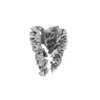



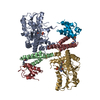
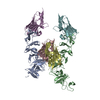
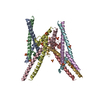
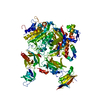
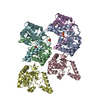


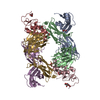

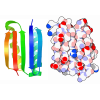







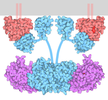

 Z (Sec.)
Z (Sec.) Y (Row.)
Y (Row.) X (Col.)
X (Col.)





















